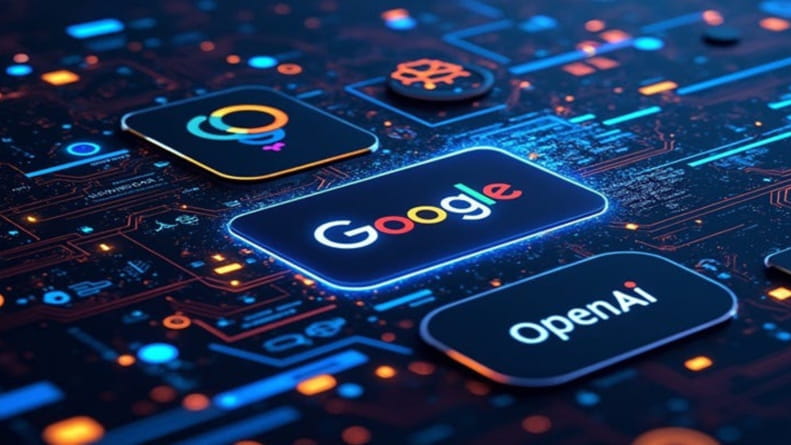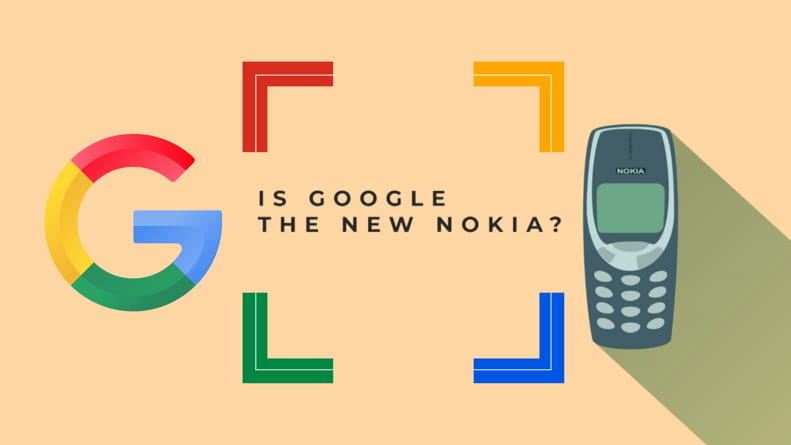Mostly, There are only two electronic gadgets that hold a special place in our heart: the Sony Walkman and the Nokia 3310. The Nokia 3310 wasn’t just a phone—it was a companion. I used it to call and text first love. Its nostalgic ringtone still has the power to transport us back to our childhood, to simpler times. We’ve yet to meet someone who didn’t love Nokia.
But how do giants like Nokia fall? Nokia wasn’t just a good company—they were trailblazers, innovators, adored by millions worldwide. They had a global fanbase that would defend them against any competitor. Yet, even with all their might, they couldn’t shield themselves from the storm of disruptive innovation.
The turning point was the launch of the iPhone. It wasn’t just another phone; it was a revolution that reshaped consumer expectations. And suddenly, the once-mighty Nokia couldn’t keep up.
Fast forward to today, and we find ourselves asking: could Google suffer the same fate? Last year, we realized something shocking—our reliance on Google Search had dropped by 90% since the launch of ChatGPT. While Google’s iconic pages of blue links had served us all well for years, ChatGPT feels more intuitive, more human, and much faster.
So, is Google the new Nokia? Or are we about to witness the greatest turnaround story in tech history? Whichever path it takes, one thing is clear: there are lessons to be learned from this moment.
As some reflected on this into four simple words: Too Powerful, Too Blind.
The Nokia Parable: A Warning for Giants
Nokia’s story is a cautionary tale. In the early 2000s, it dominated the mobile phone market, accounting for 40% of global mobile phone sales in 2007 (Statista). Yet, its failure to embrace smartphones and software-focused ecosystems led to its downfall. By 2013, its mobile division was sold to Microsoft. Could Google, with its stronghold on search and advertising, fall into the same trap?
Google’s Empire: An Overview
Google isn’t just a search engine; it’s a sprawling empire. As of 2025:
- 92.3% of global search market share (Statista).
- Over $280 billion in revenue in 2023, 78% of which came from ads (Alphabet Financial Report).
- Diversified ventures into cloud computing, hardware (Pixel, Nest), self-driving cars (Waymo), and AI research (DeepMind).
Yet, Google’s reliance on search and advertising remains a potential Achilles’ heel. Let’s break it down further: around 60% of Google’s revenue comes from Google Search. If this trend continues, it doesn’t take a business genius to foresee trouble on the horizon for Google. Just like Nokia underestimated the rapid pace of technological evolution, is Google now blind to the disruptive wave of AI tools?
Why Google Could Be the Next Nokia
1. Over-Reliance on Advertising Revenue
Google’s primary revenue stream is advertising, accounting for the bulk of its earnings. However:
- Ad fatigue is growing among users, with 42% of internet users using ad blockers in 2024 (Statista).
- Platforms like Amazon and TikTok are eating into its share of product search and social media advertising.
- A shift toward privacy-first ad models, as seen with Apple’s App Tracking Transparency, challenges Google’s data-driven advertising model.
Table: Advertising Revenue Breakdown (2023)
| Platform | Revenue ($ Billion) | Market Share (%) |
|---|---|---|
| Google Ads | 219 | 29.7 |
| Meta Ads | 115 | 15.6 |
| Amazon Ads | 45 | 6.1 |
(Source: eMarketer)
2. Regulatory Scrutiny and Antitrust Laws
Governments worldwide are cracking down on tech monopolies.
- In 2023, the EU fined Google $2.4 billion for antitrust violations in shopping ads (European Commission).
- The U.S. Department of Justice filed a lawsuit alleging monopolistic practices in search and advertising.
- Such actions could lead to the breakup of Google’s ecosystem, weakening its competitive edge.
3. Failure to Fully Leverage AI

While Google is an AI leader, it faces tough competition from tools like ChatGPT, which have redefined how users interact with information.
- AI-driven search is growing, with predictions that 30% of searches will use conversational AI by 2027 (Gartner).
- Microsoft’s integration of ChatGPT with Bing has captured a portion of Google’s market share.
Google’s AI tool Bard has received criticism for lagging behind in innovation and usability, making it vulnerable in the AI arms race.
4. Complacency and Bureaucracy
Large organizations often fall victim to their own success.
- Google’s sprawling bureaucracy can stifle innovation, leading to missed opportunities in emerging fields.
- Its product pipeline has seen missteps, such as the underwhelming performance of Google Glass and Stadia, its now-defunct cloud gaming service.
Why Google Might Avoid Nokia’s Fate
1. Diversified Portfolio
Unlike Nokia, Google isn’t tied to a single product. Its ventures include:
- Google Cloud, the third-largest cloud provider globally, with 10% market share in 2023 (Canalys).
- Waymo, a leader in self-driving cars valued at $30 billion (TechCrunch).
- DeepMind, whose AlphaFold AI transformed protein folding research.
2. Brand Equity
Google’s name is synonymous with search. Phrases like “Google it” cement its cultural relevance, giving it an edge over competitors.
3. Massive Cash Reserves
With over $140 billion in cash reserves (Alphabet Financial Report, 2023), Google has the resources to weather storms, acquire competitors, and invest in innovation.
What Google Needs to Do to Stay Relevant
1. Rethink Advertising
Google must adapt its advertising model to prioritize user privacy and offer ad-free options for premium users.
2. Double Down on AI
To compete with OpenAI and Microsoft, Google must:
- Accelerate Bard’s development.
- Integrate AI across all products seamlessly.
3. Strengthen Consumer-Focused Innovations
Products like Pixel smartphones and Nest devices need to deliver unmatched value to build consumer loyalty beyond software.
4. Address Regulatory Concerns Proactively
Engaging with regulators transparently and adhering to fair competition laws can reduce the risk of costly lawsuits.
Conclusion: Will Google Fall?
Google’s dominance is undeniable, but history has shown that even the mightiest can fall. The rise of AI, privacy-first policies, and regulatory hurdles present significant challenges. However, Google’s diversification, cash reserves, and brand equity position it well to adapt.
Whether Google will follow Nokia’s path or carve a new chapter in tech history depends on its ability to innovate and address the changing needs of users.
What’s your take? Is Google’s reign unshakable, or could it be the next casualty of the tech world’s relentless evolution?








One Response
For me google will sustain due to multi products and realization for future requirements!